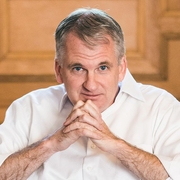- Level Foundation
- المدة 24 ساعات hours
- الطبع بواسطة Yale University
-
Offered by

عن
Ukraine must have existed as a society and polity on 23 February 2022, else Ukrainians would not have collectively resisted Russian invasion the next day. What does it mean for a nation to exist? Is this a matter of structures, actions, or both? Why has the existence of Ukraine occasioned such controversy? In what ways are Polish, Russian, and Jewish self-understanding dependent upon experiences in Ukraine? Just how and when did a modern Ukrainian nation emerge? For that matter, how does any modern nation emerge? Why some and not others? Can nations be chosen, and can choices be decisive? If so, whose, and how? Ukraine was the country most touched by Soviet and Nazi terror: what can we learn about those systems, then, from Ukraine? Is the post-colonial, multilingual Ukrainian nation a holdover from the past, or does it hold some promise for the future?الوحدات
The Course
23
Videos
- Ukrainian Questions Posed by Russian Invasion
- The Genesis of Nations
- Geography and Ancient History
- Before Europe
- Vikings, Slavers, Lawgivers: The Kyiv State
- The Grand Duchy of Lithuania
- The Rise of Muscovite Power
- The Jews of Early Modern Ukraine (Glenn Dynner)
- Polish Power and Cossack Rebellion
- Global Empires
- Ottoman Retreat, Russian Power, Ukrainian Populism
- Habsburg Curiosity
- Republics and Revolutions
- Interwar Poland's Ukrainians
- Ukrainization, Famine, Terror: The 1920s-1930s
- Colonization, Extermination, Ethnic Cleansing: the 1940s
- Reforms, Recentralization, Dissidence: The 1950s-1970s
- Before and After the End of History
- Oligarchies in Russia and Ukraine
- Maidan and Self-Understanding (Marci Shore)
- Comparative Russian Imperialism (Arne Westad)
- Ukrainian Ideas in the Twenty-First Century
- The Colonial, the Post-Colonial, the Global
26
Readings
- About the Course
- About Tim Snyder
- Disclaimer
- Readings: Ukrainian Questions Posed by Russian Invasion
- Readings: The Genesis of Nations
- Terms and Readings: Geography and Ancient History
- Terms and Readings: Before Europe
- Terms and Readings: Vikings, Slavers, Lawgivers: The Kyiv State
- Terms, Readings and Map: The Grand Duchy of Lithuania
- Terms and Readings: The Rise of Muscovite Power
- Readings: The Jews of Early Modern Ukraine
- Readings: Polish Power and Cossack Rebellion
- Terms and Readings: Global Empires
- Terms and Readings: Ottoman Retreat, Russian Power, Ukrainian Populism
- Terms and Readings: Habsburg Curiosity
- Terms and Readings: Republics and Revolutions
- Terms and Readings: Interwar Poland's Ukrainians
- Terms and Readings: Ukrainization, Famine, Terror: The 1920s-1930s
- Terms and Readings: Colonization, Extermination, Ethnic Cleansing: the 1940s
- Terms and Readings: Reforms, Recentralization, Dissidence: The 1950s-1970s
- Terms and Readings: Before and After the End of History
- Terms and Readings: Oligarchies in Russia and Ukraine
- Readings: Maidan and Self-Understanding
- Readings: Comparative Russian Imperialism
- Terms and Readings: Ukrainian Ideas in the Twenty-First Century
- Terms and Readings: The Colonial, the Post-Colonial, the Global
Auto Summary
"The Making of Modern Ukraine" is a foundational course in the Arts & Humanities domain, offered by Coursera and led by an expert instructor. This engaging program explores the emergence and existence of Ukraine as a nation, delving into its historical, cultural, and political contexts, and its significance in relation to Polish, Russian, and Jewish identities. The course spans 1440 minutes and is available under the Starter subscription. Ideal for those interested in understanding the complexities of nation-building and Ukraine's unique position in global history.

Instructor
Timothy Snyder

